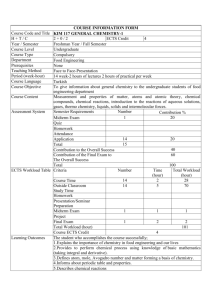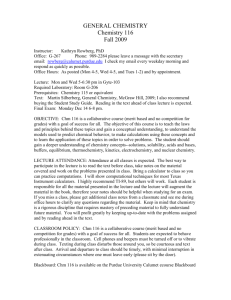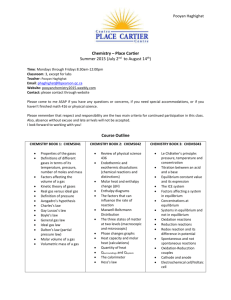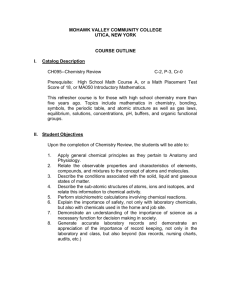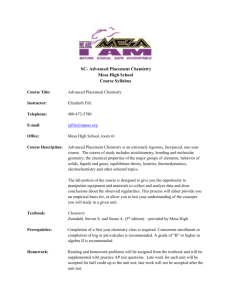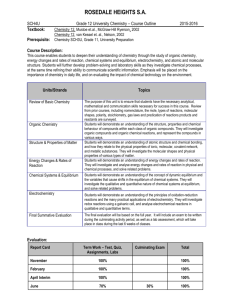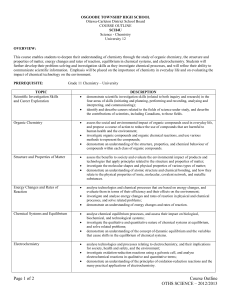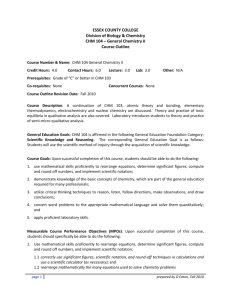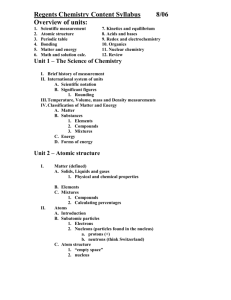COURSE INFORMATION FORM Course Code and Title KIM 118
advertisement
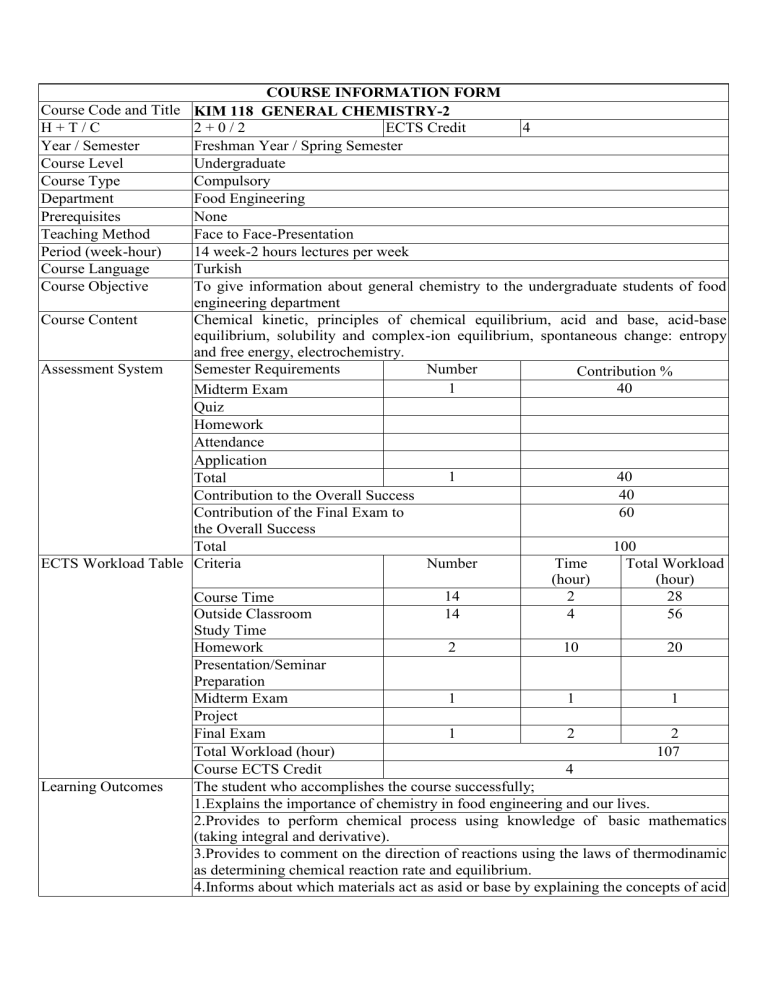
COURSE INFORMATION FORM Course Code and Title KIM 118 GENERAL CHEMISTRY-2 H+T/C 2+0/2 ECTS Credit 4 Year / Semester Freshman Year / Spring Semester Course Level Undergraduate Course Type Compulsory Department Food Engineering Prerequisites None Teaching Method Face to Face-Presentation Period (week-hour) 14 week-2 hours lectures per week Course Language Turkish Course Objective To give information about general chemistry to the undergraduate students of food engineering department Course Content Chemical kinetic, principles of chemical equilibrium, acid and base, acid-base equilibrium, solubility and complex-ion equilibrium, spontaneous change: entropy and free energy, electrochemistry. Assessment System Semester Requirements Number Contribution % 1 40 Midterm Exam Quiz Homework Attendance Application 1 40 Total 40 Contribution to the Overall Success Contribution of the Final Exam to 60 the Overall Success Total 100 ECTS Workload Table Criteria Number Time Total Workload (hour) (hour) 14 2 28 Course Time Outside Classroom 14 4 56 Study Time Homework 2 10 20 Presentation/Seminar Preparation Midterm Exam 1 1 1 Project Final Exam 1 2 2 Total Workload (hour) 107 Course ECTS Credit 4 Learning Outcomes The student who accomplishes the course successfully; 1.Explains the importance of chemistry in food engineering and our lives. 2.Provides to perform chemical process using knowledge of basic mathematics (taking integral and derivative). 3.Provides to comment on the direction of reactions using the laws of thermodinamic as determining chemical reaction rate and equilibrium. 4.Informs about which materials act as asid or base by explaining the concepts of acid Course Stream Course Sources Contribution of the Course to Department Learning Outcomes and base. 5.Informs about electrochemistry. 6.Has knowledge of solution preparation. 7.Has information about the chemical analysis. 8.Explains how we encounter with all this information in our current lives. Week Education Modules Preliminary Documents Studies 1. Chemical Kinetics Presentation Proposed Preparation Sources 2. Chemical Kinetics Presentation Proposed Preparation Sources 3. Principles of Chemical Equilibrium Presentation Proposed Preparation Sources 4. Principles of Chemical Equilibrium Presentation Proposed Preparation Sources 5. Acids and Bases Presentation Proposed Preparation Sources 6. Acids and Bases Presentation Proposed Preparation Sources 7. Acid-Base Equilibria Presentation Proposed Preparation Sources 8. Mid-Term Exam 9. Resolution and Complex-Ion Equilibria Presentation Proposed Preparation Sources 10. Entropy and Free Energy 11. Electrochemistry Presentation Proposed Preparation Sources Presentation Proposed Preparation Sources 12. Metals Presentation Proposed Preparation Sources 13. Ametals Presentation Proposed Preparation Sources 14. Nuclear Chemistry Presentation Proposed Preparation Sources 15. Nuclear Chemistry Presentation Proposed Preparation Sources 1.Petrucci, R. H., Harwood, W.S. and Herring, F.G. 1993; General Chemistry 1, Palm Publishing. 2.Mortimer, C.E. 2004; Modern University Chemistry 1, Çağlayan Books. 3.Alpaydın, S. and Simsek, A. 2009; General Chemistry, Nobel Publishing. Course Learning Outcomes Dep. Learn. Outcomes 1.Explains the importance of chemistry in food engineering and our 1, 2, 3 lives. 2.Provides to perform chemical process using knowledge of basic 2 mathematics (taking integral and derivative). 3.Provides to comment on the direction of reactions using the laws of 2 thermodinamic as determining chemical reaction rate and equilibrium. 4.Informs about which materials act as asid or base by explaining the 1, 2, 3 concepts of acid and base. 5.Informs about electrochemistry. 2 6.Has knowledge of solution preparation. 1, 8, 11 7.Has information about the chemical analysis. 1 8.Explains how we encounter with all this information in our current 1, 4 lives. Course Coordinator(s) Assist. Prof. Cemalettin BALTACI, Assist. Prof. Sevim Beyza ÖZTÜRK SARIKAYA, Assist. Prof. Ali GÜNDOĞDU
